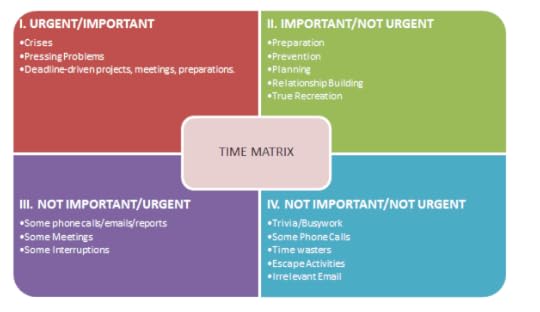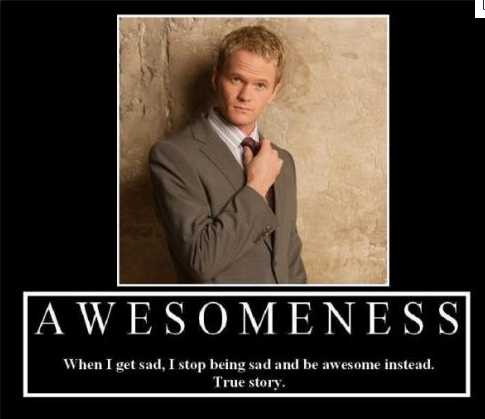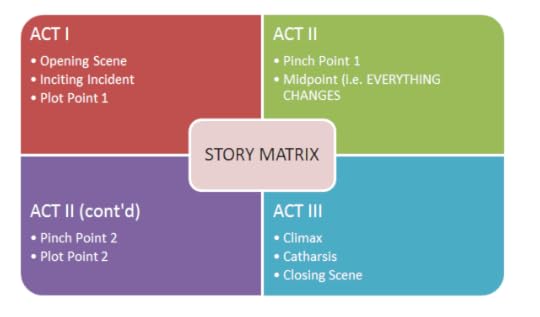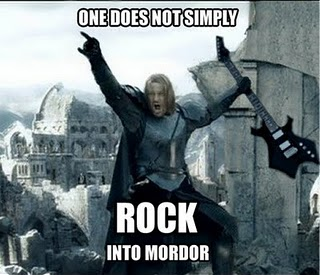Cate Morgan's Blog, page 24
June 17, 2012
Habit 7: Sharpen The Saw (Intro)
Or, The Balancing Act of Awesome
Sounds a bit violent, doesn’t it? I can see you eyeing me distrustfully, wondering what, exactly, I intend to do with said saw, once it’s sharpened. And is that rust or dried blood on the blade? No, wait, nevermind–we don’t want to know.
Actually, it doesn’t even have to be a saw you’re sharpening. Go on. Choose the pointy weapon of your choice. I like to pretend my saw is really a sword, approximately 30 inches in double-edged blade length, with a nice, deep fuller for the blood . . . But that’s just me.)
Sharpening the saw (or sword, or switchblade, or whatever) is what makes all the other habits possible. Ah. You knew I was going to get there eventually, right? Well, here we are. Don’t say I didn’t tell you so.
Sharpening the edges on your spiked brass knuckles means investing in yourself, on several different levels: the physical, emotional/social, mental, and spiritual.
The same applies to being a writer, because–let’s face it–there’s SO much more to being a writer than lounging around in one’s jammies and taking direct instruction from the Divine Muse. Especially in this day and age when readers are more engaged than ever, and reading more than ever. Which is supremely awesome, by the way. It just means that, as writers, we’re more involved than ever in the process.
This means we’re working harder than ever. We are, without a doubt, the hardest working monkeys in show biz. And that means we need to take the time and effort to invest in the story engines that are us. Otherwise we run down, start knocking about and going clank at the most inopportune times. Next thing you know, you’re on a lift in a long line of other cars, and the mechanic is shaking his head in a slow, sad, expensive sort of way.
We can’t be responsible for anything or anyone else if we’re not responsible for ourselves first.
In the chocolate bars of Big Chocolate Bars, these are the biggest and the chocolatiest. (Yes, that is a word. I know because I just made it up.)
Every week on Sunday morning, over extra-strong coffee and Ninja Kat shenanigans, I ask myself, “Self! What is the One Thing (points index finger) I can do This Week (stabs calendar) in each of these four sections (jabs repeatedly and violently at planner) to sharpen my claymore in preparation of making heads roll this week?
It’s best, when starting out, to start small. Small accomplishments lead to medium-sized accomplishments, which creates habit, which then leads to bigger and awesomer stuff, which leads to balance. Kind of like that brat Goldilocks and the Three Bears.
Writer Monkey being one of my many roles, I also have to say to myself (in declamatory pose), “Self! (points to self) What is the One Thing (points index finger to Heavens) I can do This Week (prances about, tearing pages off calendar) as a professional and, verily, awesome Word Wrangler (super hero pose) in these four Sword Sharpening areas (en garde) to become even awesomer? (Yes, that is also word. Because–you guessed it–I made it up, too.) (Collapses on floor from all this unaccountable activity.)
And we’ll go into all these things, individually and en masse, over the next few weeks. So brace yourselves for impact, folks!
In the meantime, do yourself a favor. What is the One Thing you could do this week (that you’re not already doing) that could make life awesome for yourself? Then do yourself an even bigger favor: do it.
Next Time: Habit 7: Sharpen The Saw Part 1–Physical








June 12, 2012
You’ve Been Flashed
From The Nefarious Penmonkey His Own Self, Chuck Wendig, a challenge of flashy proportions: Flash Fiction Challenge: Choose Your Setting! (That clank you just heard was the gauntlet being thrown).
Well, sirrah, I take up that gauntlet, and use it to protect my writey hand from the venomous prose shrieking from my purple pen (or is that the other way around?). Here are your thousand words, nearly all of them adverbs! En garde!
How To Succeed In Business Without Really Trying
Or, A Good Accountant Is A Terrible Thing To Waste
The Venom Club resembled no other gentleman’s club Walter had ever experienced. Not that he’d experienced any in the flesh, as it were. His ideas about such places came from bad cop shows accompanied by even worse TV dinners, but he was pretty sure how it was supposed to go: a bevy of bored, half naked dancing girls on nonsensical stilts, mostly comprising of leg as far as his world view was concerned. He’d imagined cheap perfume masking more disturbing smells, and near-black lighting to hide the clientele and the stains.
How it was not supposed to go: a tasteful townhome amidst a row of identical townhomes, on a street of similar. It was not supposed to include mellow, genteel street lighting and an inconvenience of parking. Walter was an accountant. A good one. And this, he feared, did not compute.
The others of his party seemed to agree, in which he found unexpected relief. Big, barreling men in big shiny suits with bigger, shinier wallets and ties like snakeskin drifting down their invaluable fronts in lazy lengths. All with names like Jack, Jim, and Jerry. Only his boss, John, showed any confidence in the place. John’s suit was the biggest, his wallet the shiniest, his tie the snakiest. His smile the widest.
Walter, short and slightly balding, drifted forgotten among the outskirts of this school of sharks, even though this was ostensibly his party. A party he did not want, for a promotion he did not want. He wanted his gray cell-block office back, with its field of small grey cubes, and reassuring murmur of keyboard keys tick-tick-ticking away the time. He only wanted to be an accountant.
He tripped over the bottom stair. No one noticed.
A musical trill when the front bell rang, followed by a cultivated buzz. John opened the door, and ushered his guests in. “Come, come, Wally,” he boomed. “It’s rude to keep the ladies waiting.”
Walter hated to be called Wally. He trailed behind the sharks and dreaded his fate.
The ladies, as he suspected at this point, countermanded all his expectations. Barefoot and draped in different jewel-toned silk kimono, eight ladies of varying coloring and size draped in varying languid poses among the collection of arm chairs and sofas the parlor, a room of muted elegance. A ninth woman, robed in black to match strange, pupil-absent eyes, drifted forward to greet them.
“Punctual as ever, Mr. Crassman.” But her eyes found Walter, froze him in place. “Is this our guest of honor?”
“And a new addition for membership, I hope,” Walter’s boss removed an overcoat speckled with iridescent rain. Someone came forward and took it from him, though Walter never saw. The languorous atmosphere of the room worked its way into his blood stream.
“As always, sit and make yourselves comfortable. Walter, I hope we can make this a memorable visit for you.”
Walter couldn’t speak. Again, no one noticed, except for her.
He could move, though. And his coat was suddenly gone. Two women apiece latched on to one member of his party, and drew them away to the couches and chairs. As ties were loosened and shoes removed, Walter found himself drifting behind their hostess. As he passed through the room he thought he perceived a flash of elongated incisor. But then it was gone, and he forgot all about it.
The dark-eyed woman drifted down a narrow, dim hall. He followed her into a study with a fire blazing at a temperature he reckoned appropriate for melting iron into tempered steel.
“Feel free to sit, Walter.” A cushion prodded him in the sensible suit pant. He wasn’t entirely certain how it got there. “Drink.” A small snifter of honeyed garnet appeared at his elbow. It burned going down, but not unpleasantly.
She sat across from him and waited for him to finish his drink. “I congratulate you on your promotion, Walter. How long have you been looking forward to it?”
“I wasn’t.” Walter tried to swallow the words, but they wouldn’t stop coming. “That is to say, it was all rather sudden.”
“Yes, I imagine it was. What are your dreams, Walter?”
He blinked, nearly surprised out of his stupor. “Dreams?”
“Everyone has them, Walter. Even you.”
“Me?” An image flashed in his mind, sudden as a suspected incisor. Miss Halperin had a beanpole figure, dish water curls, and a mind like a steel trapped calculator. When she leaned against her cubicle wall to speak with the top of her neighbor’s head on the other side, she resembled nothing so much as an upright mop after a thorough going over.
“Your dreams are not the dreams of your friends, granted. Theirs are rich fare, and there’s rather a lot of it. They believe they dream like kings. How do you dream, Walter?”
“I’m not sure.” He felt unaccountably shocked at the truth of it. “I’m just an accountant.”
The black-eyed woman’s eyes filled his world. He could see himself in them, floating. “Would you like to find out?”
A moment or an hour and an eternity later, Walter shrugged on his coat in the front parlor. The room was empty, with no sign anyone had been there all night. Yet he felt certain there had been company just moments ago.
Of course, it was no business of his. He was merely the private accountant of the establishment, and paid overly well for his services. But now work was over, and he was meeting Suzanne Halperin for the third time this week. He had a mind to hire her away from his old firm by offering her a partnership.
The gray drizzle had tapered to drips and drabs. He strolled down the dark, damp street, whistling.
It looked like being a beautiful night.








June 10, 2012
Interlude In Chocolate
 Or, Zen and the Art of Chocolate
Or, Zen and the Art of Chocolate
Now that I have your attention, let’s do an experiment. Here’s what you need:
2 large jars of equal size, large as you like.
Enough bags of small candy to fill one of the jars not quite to the top. I recommend M&Ms, but that’s just my personal preference.
A bunch of large candy bars
Labels (optional)
Marker
We’re going to talk about goals and prioritization. Actually, I’m going to blog, and hopefully I still have your attention with the mountain of chocolate.
We all have roles in life. We’re parents and children and siblings, employees, housekeepers and cooks, volunteers and, of course, writers. On each candy bar, write or label each of your roles. Line them up in the order of importance.
Okay, fill one of the jars with small candy. You might not fill it all the way to the top, but that’s okay. Get as close as you can. It goes without saying, but I’ll put it in writing anyway: escapees are fair game. Now, one at a time, try to fit the big candy bars into the full jar. Go on, I’ll wait while you stand on a chair for leverage and use the meat mallet. Try to not break anything.
Finished?
Doesn’t work very well, does it?
Now pull the chocolate bars out of the candy, apologize for trying drown them in the chocolate witch trials, and realign them in order of importance. “Writer” is probably somewhere toward the end, because roles like “parent” or “employee” most likely come first. The whole “starving writer” gig tends to lose its charm after the age of twenty so. But do not despair; it isn’t the end of the world.
Now put the chocolate bars in the empty jar, again in order of importance. Dump the full container into the one with the candy bars a la New York mob. Laugh diabolically if you like. Oh, go on. It’s fun.
See where I’m going with this?
The moral of the story is life is full of minutiae, and we’re often tricked into believing it’s important. Fact of the matter is, minutiae is exactly what it looks like. It piles up around us, burying us, masking what is truly important.
Prioritization works the other way around.
You make room for the big, important stuff, and if a few M&Ms fall to the way side in the process, well, you can laugh. (Have I mentioned how much I love this demonstration? *crunch crunch crunch*)
I will bet you a crisp, new twenty dollar bill you forgot a role.
Forgot yourself, didn’tcha?
I thought as much. *grins*
You, as in YOU, are an individual-type person, complete and whole. You deserve some prioritization too, so be sure you take at least a little time for yourself, even if it’s only a half hour here and there.
One of my favorite me-rituals takes place on Sunday morning. The husband is still snoring merrily away like a grizzly bear hibernating for the winter. The coffee is fresh and piping hot, the resident Ninja Katz cavorting about my ankles. I sit at the dining room table and plan my week: What do I need to accomplish? How will I meet my goals?
Goals on their own are lovely, all bright and shiny and full of promise. Especially writing goals. But they do you no good whatsoever if you don’t have a plan to reach them. A word count goal or a promise to yourself to write every single day the sun brings is a good start.
Know what works better? Specific steps, or mini-goals, to get you there. Whether you’re a pantser, planner, or somewhere in the middle, you need milestones to reach for. I’m seriously OCD (I prefer the term “Zen”), and I like balance in my life every bit as much as coffee and M&Ms. I also work on more than one project at a time, whether I’m in the discovery stage of one and the revision or rehabilitation stage of a second, which requires optimal prioritization.
It doesn’t have to be painful. I have a specific process, with very specific tasks. I assign myself tasks in groups of three for each project each week. and if you’re a full, er, on pantser, you can brainstorm a scene before you write it. This way you get a real feel for what you’re working with before forming definite words around it. Yanno, minimizing the staring at the Blinking Cursor of Doom while maximizing the typeity-typeity. It isn’t planning so much as discovery, and one of my favorite parts of writing.
Do yourself a favor and consolidate either your writing or your you time with studying your craft. Spend some time reading and analyzing what you’ve read, or join a critique group just to read the work of others. You’ll gain beaucoup perspective. Every bit of insight helps.
Let’s review.
Block out time at the beginning of the week and assign yourself specific, reachable tasks in order to accomplish a larger goal.
Invest time to develop your craft, so your art will transcend craft.
Finally, treat your time as valuable. If you don’t, who will?
Ummmm . . . gonna eat those M&Ms?
Next Time: Habit 7 In Four Acts–Act I








June 1, 2012
HABIT 6: Synergize
Or, Die Hard: The Solitary Writing Life
 I’m going to do something a little different with Habit 6. For the past 5 I’ve gone into the Franklin Covey school of thought behind the habit, then how we can apply said habit to both our writing lives and the story telling process.
I’m going to do something a little different with Habit 6. For the past 5 I’ve gone into the Franklin Covey school of thought behind the habit, then how we can apply said habit to both our writing lives and the story telling process.
This time I’m going talk about of one the greatest benefits of the writing life—in this day and age of the Dread and Ever-Ruling Interwebz, no writer need ever be alone again. The whole solitary writer staring purposefully out a garret window somewhere in New England (Hellllloooooo, HP Lovecraft) no longer applies. In fact, it no longer even comes close to applying. Now there are a mob of writers below, throwing rocks at the window and asking Mom if Solitary Writer can come out play with the rest of the misfits.
Seen the social media landscape lately? My goodness, there’s a lot of us out there. And more coming all the time, with e-business models blowing up seven landscapes in a single explosion. It seems everyone and their neighbor’s cousin’s best friend’s dog’s gerbil is doing some kind of writing, and the possibilities equally endless.
Naturally some silliness must ensue. But then, we’re writers. Silliness is par for the course. And I am all about the silly.
Franklin Covey describes synergy (Hey, Frank—the 1990s called and they want their vocab back)as coming together to find creative solutions to old problems.
Well, duh. Isn’t that what being a writer all about?
Today it’s as easy as plugging in the old dial-up and firing up the tools of the trade. There’s writing and critique groups all over the place. Word sprints and writing prompts on Twitter. Got writer’s block? Need to know the name of a weird medieval torture device? Need to cheer a word count or commiserate a lack thereof? The support you need is no further than a few tappity-taps away.
Candles Bolstered Against The Wind
There’s an old saying that a candle is never diminished by lighting another candle, and it’s true. In fact, with every candle you light the darkness recedes just a little bit more. And this job is hard, yo. And the pay sucks monkey balls. Why, in the name of the Big Cheese Playwright Guy, would we want to do it alone?
Let’s face it: no one gets it but us. Every day at lunch a bunch of us hard-core readers sit together. Read, read, read. Loved this, didn’t like that so much, what’s up with that other thing? Of all us misfits, however, only myself and one other person are story tellers. When one of us talks about how the pacing or voice didn’t work for us, or loving the use of subtext here, the subtle characterization there, midpoints and plot points and who knows what else, the other will nod knowledgably and make some sort of witty in-joke or comparison. Meanwhile the rest of the table has backed away slowly until it’s safe to make a run for it.
That’s because storytellers speak the same language, no matter the medium in which we speak it. Not only do we know why we liked or didn’t like a certain aspect of a certain work, we can pinpoint the technical aspects of the why. Jargon in this biz sounds an awful lot like speaking in tongues.
I may be weird, but at least I’m not alone in my weirdness. And neither are any of you. We’re in this crazy, hang gliding over hell journey together, and it’s nice to know there’s folk on the other side of the abyss prepared to catch us when we stumble.
Point being, for every success we experience, we need to pay it forward and thank the people who helped us get there. For every success someone else experiences, no matter our personal feelings, we need to cheer them on. This is a tough biz. A win for one of us is a win for all of us.
Little Black Book
So we’ve talked about synergy. We’ve talked about sharing the writerly love by lighting candles. We’ve talked about the sharing of ideas and creative solutions to age-old problems.
If you’re anything like me, fellow Word Wranglers, you often find you have, if anything, too MANY ideas.
In fact, I’ve gotta a (literally) little black book of them. And I’m not afraid to share them with anyone and everyone, even on the Dire Interwebz. You can take all my ideas and run for the hills, cackling the evilest of laughs, and I won’t care. Know why?
Because there are no new ideas.
Say it with me now:
THERE ARE NO NEW IDEAS.
Ahem.
Here’s the other secret: Size doesn’t matter. It’s what you do with it that counts. You gotta be bold. You gotta be fearless. You gotta have confidence (but not overly much), and you gotta have technique. Otherwise you’re just waving it around aimlessly to no effect.
One part talent, two parts craft, and just a soupcon of savvy–that’s the ticket.
You can take a hundred people, give them the same idea, and you’ll come up with a hundred wildly different stories. Some versions will be better than mine. Maybe all of them. But that’s okay. I’m in awe of the tremendous talent out there. I’m thrilled to itty-bitty-bits to be keeping such company. I’m completely serious.
So serious, in fact, I’m going to start posting my ideas on this blog. And if one of you takes one of those ideas and becomes a millionaire with a mansion and a yacht and laughs like a maniac all the way to the bank, then hey—I can say “I knew you when”. Or not. Either way, our community will be richer for another success.
And I’ll find another candle to light.
Next Time: Interlude in Chocolate








May 23, 2012
HABIT 5: SEEK FIRST TO UNDERSTAND
One of the most basic, and yet most important, needs of the human heart is to be understood. The same might be said of the writerly soul. Our voices are born of our life experiences matched with an ingrained need to tell stories, and to say something important to us through those stories (also known as theme. See what I did there just now? Oh, yeah.)
Habit 5 is the natural offshoot of Habit 4: Think Win/Win. It’s about listening, truly listening. Most of the time human nature dictates that when someone else is talking you’re already forming a response—the pithier, the better. ‘Cause we’re such clever little Dickies, aren’t we? Of course we are.
The effective Word Wrangler listens. Really listens. Why? Because people are where the stories are. There is a wealth of experience in the world other than ours, and a writer’s journey to discover these stories is never over. True listening seeks to learn, and thus to understand. Shrinks get paid a whole lotta mullah to do just that.
You Have The Right To Remain Silent
Franklin Covey calls the highest possible listening skill Empathic listening. It is the art—and it is just that—of listening without all the habits raging to consume us while another person is talking. It is listening without intent to advise, share, refute, imply, solve, judge, agree, question, analyze, sing, dance, hum, whistle, recite the grocery list, etc. It is:
Focusing on the speaker, not just remaining silent while waiting for your turn to talk.
Repeating what the speaker says in a way that seeks understanding.
Not fearing silence. Zipping lip is, a lot of the time, the very best thing a listener can do. If someone is talking, it’s usually because they want to be heard.
Seeking verification of how the speaker feels. Rephrasing or summarizing what they have said can provide the speaker with the feeling that they have been heard. And isn’t that what we all want, really?
Hearing Is Believing
Where Empathic listening comes into play for the effective Word Wrangler is in finding the stories. Yes, I know. Word Wrangling is all about story telling, not story hearing. But think about this: isn’t reading just another form of listening? How else do stories get passed along? And you do want people to read your stories, and think they’re the awesome in the sauce, right? So listening, not just to what is said, but what isn’t (between the lines, as it were) not only gives the savvy Word Wrangler an ear for dialogue, but one for subtext. Subtext is King.
Ever hear someone describe some little anecdote around the water cooler, or start a sentence with “Wouldn’t it be cool if . . .” and your brain went into overdrive in the fast lane of “Whoa, hey, there’s a story there, boy howdy”? These are magical moments. Cherish them. Pat them. Call them George. Ask some probing questions. Show interest for your own nefarious purposes. Listen. A lot of times it’s easy to forget there’s a whole marvelous world swirling around outside our heads.
It’s A Mad House
Know who else you should listen to? The voices in your head. Know who they are? Characters, all striving to be born, to live and love and learn and despair and wallow in all the frailties human beings are heir to. Characters are people, too, don’tchaknow.
There are four parts of my character development plan. I generally develop 3-4 main characters, and each one gets a file: Protagonist, Antagonist, Romantic Interest and/or Helper. Here’s what’s in the file:
Character Sketch: Everything from hair/eye color, mannerisms, career/financials, to where they were born, where they live now, what they drive and what their favorite room in the house is—and what the view out the window is like. I give each main character a sacred object, something they’re attached to, like a weapon or vehicle or even a pair of boots or piece of jewelry. Something that doesn’t define them, per se, but is wholly recognizable as theirs. I also like to include pictures and “cast” my characters, since I’m a visual person.
Back Story: This will include a timeline from birth through various life milestones until the time the story opens. Any or all of these can open a door into memory, to get an idea of their experiences and how it influences the way they tick, the way they feel. What this works great for is timed writing: 5, 10, or 15-minutes stints in a notebook to warm the hand and mind while getting into the head of a character. This works really well for when I’m stuck.
Dream: This is another really great writing prompt, and can help lever off the top of a character’s brain so you can get to the ooey gooey bits. Use the start line: In the dream he (or she), and do a timed writing. Highlight or circle all the repeated images (these come in handy for symbolism) and look them up in a dream interpretation guide. You may be surprised by what you might learn.
Wardrobe: I love this bit. I get to go “shopping” for my characters without having to spend any money. I’ll describe a character’s style, use pictures, decided what’s appropriate for their age, career, where they live, their financial situation the events of a scene. Catalogs and online stores make excellent reference tools for this. That old adage about telling a lot about a person by their shoes is more true than you think.
In order to fully develop a character, you have to listen to what they’re trying to tell you, and with a clear, open mind. Stories not only begin with people, but live on through them and in them. By taking yourself out of the equation, stories thrive. And isn’t that what we want?
Next Time—Habit 6: Synergize








April 9, 2012
HABIT 4: Think Win/Win
Or, Opinions are like assholes: everyone's got one.
The human race is a competitive lot. Word Wranglers are no exception, even with the mainstream acceptance of self-publishing via Amazon and Create Space and whatever the latest whirligig is. Find a large group of people going "squee" over something, and you will find its detractors. Find the detractors, and you will find trolls, haters, bullies, and other SIS-ies: critters suffering from Severe Immaturity Syndrome. They're usually flinging poo, and there's always at least one.
We're an emotional lot, as well. We don't, as a rule, handle rejection well, no matter how well we think we're prepared for it. Rejection sets us on the defensive, and as soon as we're on the defensive, we're not listening, because we're already marshaling our arguments. And in today's world of the Dire Interwebz, and Everyone's Gotta Blog blogs, everyone now has the wherewithal to share their viewpoints with said world.
Word Wranglers don't just put our opinions out there, though. We put our stories. Products of blood, sweat, and tears. Pure, raw emotion that comes with a desperate, sometimes unhealthy, need to be liked. Our hearts soar into the sky with one acceptance, but then turns super nova with a rejection, or bad review. Up, down, up, down, up, do—Jane! Stop this crazy thing!!
Word Wrangling is especially frustrating because even with e-Publishing and readers opening up the world to a gamut of stories that might never have seen the light of day through traditional publishing methods, there is still a mentality that there is limited space available for the number of Wranglers out there to have their voices heard. And when we're rejected, it goes right to the heart. We lost. Someone else won, and all their dreams will now, no doubt, come true. But we're back to the drawing board, not sure if it's even worth the effort. It's like reading about that already wealthy octogenarian you read about who wins the lottery. Twice.
The Habit of Think Win/Win comes down to engendering good karma. About giving as well as taking. About creating a sphere of influence that will pay back our efforts tenfold on the next go around. There are three basic tenets:
Integrity: sticking with your true feelings, values, and commitments.
Maturity: expressing your ideas and feelings with courage and consideration for the ideas and feelings of others.
Abundance Mentality: believing there is plenty for everyone.
Pretty straight forward, right? And it goes both ways, being generous of spirit regardless of what end of the spectrum you're on.
The perfect example of this is Neil Gaiman. Read his blog sometime. Generous and sweet with fainting fans, so grateful, at his level of uber-doober success, for his good fortune. Yet it can cost upwards of eleventy billion dollars to book him, three-to-five years in advance, for a half hour speaking engagement. Why? Because he's a writer. His readers fully expect him to be writing, so we can reap the benefits and head-exploding joy a new Gaiman project always brings us. And he obliges, humble and lovely every step of the way.
But there's only one Neil Gaiman, you say. (As far as we know. Probably only Great Cthulhu has the right of it.) But before he became The Neil Gaiman, he already embodied the values he displays today. Word Wranglers should begin as they mean to go on.
Why? Because this is a tough biz. Whether you're working diligently as Bob Cratchett on Christmas Eve without coal, have gotten one acceptance or a hundred or none at all because you've just put your first word on your first piece of paper EVER, it never gets easy. It's difficult enough, don't you think, without getting flak from fellow Wranglers? Every time one of us breaks through the Great Publishing Wall, on whatever scale, shouldn't all of us be cheering them on EVERY GORRAM STEP OF THE BLOODY, SWEATY, TEAR-STAINED WAY?
Your task today:
Find another writer. Hug them. Virtually or physically.
Then hug yourself. You both probably need it.
Next Time: Habit 5—Seek First to Understand, Then Be Understood








March 28, 2012
HABIT 3: PUT FIRST THINGS FIRST
Or, Let's Do The Time Warp Again
One of my old bosses had a great saying, for which I bless her daily. Whenever someone tried to stick a bright red fireman hat on our heads, despite all our dodging and weaving, she would intone, firmly but fairly, "Lack of planning on your part does not necessitate an emergency on mine." And thus insanity was magically averted.
How many of us find ourselves running amok, putting out other people's fires, either at work or at home? How do we find ourselves in those situations? Don't firemen need special training, or something? I mean, there's the whole not getting incinerated thing, and all.
We need to give ourselves the freedom to manage expectations, to prioritize based on our needs rather than others'. To, yanno, breathe.
Say it with me now: Oxygen is good. Oxygen is my friend. And gosh darn it, this oxygen is mine.
It's Just A Jump To The Left…
Franklin Covey is all about the prioritization and categorization. But sometimes we get buried in so much minutiae it's impossible to see the forest for the trees, or, really, even the trees for the forest. Which tree to concentrate our efforts on? That lovely oak over there that looks just perfect for a picnic? That birch so useful in providing switches with which keep the insanity at bay? And is there a handy Redwood we can take a shortcut through?
Franklin Covey as a Time Matrix chart I've found useful. I like to call them buckets, and everything that needs doing or planning for gets dropped into the appropriate one. Budgeting time is a lot like budgeting money. You get your paycheck, you allocate X amount to bills, Y amount to food and gas, Z to Savings, etc. You can put your money into savings from the word go, of course, but bills will still need to get paid and those pesky kids do need to eat once in a while. Not too often, mind. They might get spoiled.
In the case of Time, X, Y, and Z represents buckets where you invest your limited hours (see what I did there just then?) Here's how the buckets work:

There's another old saying that an ounce of prevention can save a pound in pain, and it's true. If we invest an ounce of our time and effort in Quadrant II, we save ourselves a pound of sanity points in I and III. (Ever play Call of Cthulhu? Yeah, it's kinda like that. Do your research and don your Amulet of Indigestion +2 now, and you avoid becoming lunch later).
Moral of the story is, by planning ahead just a little, you'll have an easier time prioritizing on your terms, not someone else's. Managing expectations is key—even if it means you have to retrain some people's thinking along the way. If you don't respect your time, who will?
The idea isn't to fill your day to gasping with to-do items and appointments, but to plan in such a way as to schedule blocks of time for the Big, Important Stuff in Red Quadrant, smaller, regular chunks for the Green Quadrant, and thus leave open bits here and there for Pesky Purple.
And Then A Step To The Right
Buckets work for Word Wrangling, too. Here's what my revised Time Matrix looks like:
A lot of the items listed in the Green Quadrant I can kick out over morning coffee on a Sunday when the household is still asleep, or during my lunch hour at work. If I have a scene list in front of me, for instance, and I know what I need to work on, I can brainstorm the elements of that scene—staging, action, dialogue, imagery. Sitting outside for lunch, or in a variety of places, makes for an excellent opportunity to people watch and collect sensory detail.
I've also found that by taking a book or a legal pad out and looking busy cuts down on the interruptions. Practice your frowny face. It helps.
In Another Dimension . . .
Know what else the Bucket Brigade works for? Project-Specific organization. Whether you're using a three- or four-act structure, having a map does wonders for the savvy Word Wrangler, even if you're a tie-dyed-in-the-wool Pantser.
Screenwriters often use a technique called "breaking" a story. No, they don't drop-kick it out of a third-story window (well, alright…sometimes they do). They get out a handy legal pad and draw a line first down the middle length-wise, then across, so they have four equal quadrants. They then list scene ideas on each line, in each quadrant—each quadrant holds exactly the amount of scenes for that Act so they don't run over time. It keeps a tight, clean ship for the drafting process. So does working in Key Scenes—everything that must happen, at the proper juncture.
How many times have we started a story strong, but ended up sagging in the middle? Or rewritten Chapter One about eighteen times until it's just perfect?
That's not progress. It's holding us back. Using the matrix lets us see what comes next, even if it changes on us. It's okay. Go with it. Be flexible. That's the Muse talking, and we don't her to go away. Write hot for as long as it'll take you. Rewrites and revisions can come later.
But . . . but . . . If we take the time to determine what happens in the middle, we're more likely than not to cross the finish line. And isn't that the point?
Here's an example of a Story Structure Matrix:
Key scenes are a great way to road map your story. They're destination points, but certainly not chiseled in stone. And lawdy knows, Middles are the bane of the Word Wrangler's existence. Know what else it's good for? The Dread Query and Even-Dreadlier Synopsis. These are the key moments you want to focus on—Inciting Incident, Midpoint, and foreshadowing the Climax for your Query, and Key Scenes for your Synopsis.
(Credit to Larry Brooks of Storyfix for the magical madness of Pinch Points.)
Opening Scene: should mirror your Closing Scene.
Inciting Incident : 10% mark—The moment/catalyst that starts everything.
Plot Point 1: 25% mark/end of Act I: Complications ensue; more information becomes available to the hero; a key moment in the antagonist's Nefarious Plan finds at least some measure of success.
Pinch Point 1: Halfway to Midpoint—Added complication the hero has to squeeze their way through.
Midpoint: EVERYTHING CHANGES. (i.e., the chase begins.)
Pinch Point 2: An additional complication for our brave hero to squeak their way through.
Plot Point 2: Okay. We've made it to the 75% mark. Time to climb our way through rising action to climax. We're in the Home Stretch. Breathe, now.
Climax: The Big Moment of Truth. Dun-dun-DUUUUUUNNNN!
Catharsis: There's usually a scene post-climax where everyone relieves their feelings or emotions on the whole matter. I call this the Aftermath.
Closing Scene: The End. Really and truly. Mirrors your Opening Scene in way.
So there you have it, folks. Putting First Things First.
Next Time: HABIT 4: Think Win/Win








January 17, 2012
Habit 2: Begin With The End In Mind
Or, The Goals, They Burnssss Ussss Preciousssss . . . .
Habit 2 is all about the goals. Goals for life, goals for dreams, goals for writing. What is the most awesome thing you can do this year? Where do you want to be in five? How do you plan on getting there, Padawan?
Back in November I experienced my first taste of Being Published. There were highs, lows, and all the betweens. I wondered if it was worth the roller coaster, and if I really wanted more of it. Being a roller coaster junkie, the answer was a resounding YES.
So how do I get more? How do make it my full time job? I begin, of course, with the End in Mind.
Careers advisors in high school used to ask us what we wanted to be when we grew up, and then provided The Plan on getting there, usually involving going into debt for anywhere from four to eight years to pay for college so they could meet their quota. Thankfully, I successfully evaded their blandishments.
But the fact of the matter is, it's no good deciding that the dangerous world of professional Word Wrangling is the bee's knees, and then waiting expectantly while the universe gets to work on your behalf. "Here's your whip, your chair, a flaming hoop or two . . . off you go, have fun." It's equally ineffective to write a single story without doing your homework or polishing it up to the best of your ability, and wait for everyone to do all the work for you and offer you a gazillion dollar contract for the privilege.
Word Monkeys are craftsmen, and we work hard to become so. Ideas are a dime a dozen, possibly even cheaper. Moving into full time Word Wrangling is a difficult, exhausting, poorly-paid with no benefits job. In other words, a prospective Word Wrangler has to really, really want it in order for it to work and be worth it. Is it possible to become the next Stephen King? Sure. But the odds are greater to win the lottery, which is better paid and requires less work.
The Effective Writer Gets Specific
So you still want it. You're burning for it. You scoff at Word Monkey's well-meaning attempts to scare you off. Good for you. You still need a plan to get there.
For example, I know that if I want to retire from Evol Daye Jobbery within five years (the goal), then I am going to need A Plan of Epic Proportions in order to meet it. I am going to need to write, say four novellas a year to boost that income stream, since I already have a publisher and Enthusiastic Editor to take them two. I also need to squeeze in one novel per year, written and edited, and put it on submission track to agents and editors.
Sounds like a Plan, right? Except it's still not specific enough. Now I have to drill it down to what I need to do this year. Which ideas am I going to develop into novellas? I want at least two for my Keepers of the Flame series, so I have a trilogy to be getting on with, but what about the other two of my allotted four? Which idea am I going to develop into full-length novel? What it's going to come down to is which ideas I am most enthusiastic about, that will have the staying power to keep me excited throughout the process.
Once I have my ideas in the pipeline, I need to prioritize and come up with some deadlines for myself. I can estimate that each novella will take me approximately 90 days (3 mo) for R&D, storyboarding, drafting, and editing. That gives me one per quarter. A fantasy novel will take me about a year to implement the same process.
The Effective Writer Gets Their Groove On
Professional Word Wrangling is a tricksy business—tricksy like hobbitses. Not only do we word monkeys need to Begin With The End In Mind when it comes to our wider goals for Word Domination, Beginning With End In Mind helps tremendously when it comes to story development.
Word Wrangling doesn't always mean knowing every step on the journey, but it helps to have an End Game in mind so we know where we want to get to in the end. Say we have a hankering to drive across country. We don't just jump in a car and go. Where across country do we can to end up, and how many states are we going to hit on the way? What's the midpoint of our journey, so we know we're half way there? Are we going to New York? Boston? Florida? If wanted to start at Disneyland, and wind up at Disney World, what is the route we need to take?
I utilize a massive White Board of Story Development (also known as the Board of Awesome). On it, in black gaffer's tape (or electrical tape, for the non-theatrical folk), I have rather large rendering Aristotle's Incline marked out so I can erase stuff without losing my lines. It references my key scenes, location notes, character jottings and pictures, Notes to Self, etc. I have a smaller version of the Board of Awesome (aka Board of Lesser Awesome) for shorter works like novellas. They hang on the wall I face when at my computer.
Then I have to block out certain hours of my week to devote to writing, and nothing but writing. Novella writing happens during the week, while larger blocks of time on the weekends are develop to novels. During my lunch hours at work I try to prep for my writing time that evening. I also make a point to find down time to spend reading and paying attention to the Darling Spouse and generally taking care of business. But my writing time is sacred, and I treat it as such. If I don't, who will?
Next week: Habit 3—Put First Things First








January 8, 2012
Habit 1: Be Proactive
Or, Who Shot First?
 We've all heard the debate. Most of us have chimed in at least once, probably to vociferous response. It's right up there with Team Fangs versus Team Fur. Star Wars versus Star Trek. Mac versus PC. Yes, folks. It's time, once again, to play Planning versus Pantsing. *pause for groans*
We've all heard the debate. Most of us have chimed in at least once, probably to vociferous response. It's right up there with Team Fangs versus Team Fur. Star Wars versus Star Trek. Mac versus PC. Yes, folks. It's time, once again, to play Planning versus Pantsing. *pause for groans*
What my question is—why can't we do both? Is it possible, in the grand scheme of things, to be proactive even while pantsing? To which my response is: Well, yes. Being proactive doesn't mean planning every little thing out and sticking rigidly to said plan. What proactive means is being prepared for any foreseeable eventuality. You know, like backpacking across Europe without a solid plan in mind, just blowing along the path the wind takes you. You can either fill your backpack with a survivalist's essentials, or choose to leave the first aid kit at home.
Let's go back to the Star Wars a moment, mainly because I am the Grande Poo-Bah of Geekery. In the original version of the movie (i.e. the real version—but I digress) Han Solo shoots first. You know it. I know it. We have all been witnesses a multitude of times.
Now, good ol' Han, quite possibly the coolest cat in the whole dang 'verse, isn't much of a planner. He goes where the money is, runs for the hills when necessary (when the hyper drive manages to kick in, which ain't all that often), and more or less leads a footloose and fancy free existence. He is, quite simply, the ultimate gambler.
But. BUT. Impulsive as our favorite scruffy-looking nerf-herder is, he is always prepared for trouble. He knows exactly what do to when he finds himself in a confrontation in a crowded cantina. He plays it cool, waits his moment—and bloody well shoots first.
So the question is, as writers, are we prepared to shoot first? Or do we get the lame revised version, wherein we are caught at the first sign of trouble with our pants down?
Crash and Burn
Franklin Covey defines proactivity as the act of not only taking initiative, but being responsible for the results we get in life. For us Word Monkeys, this especially means being responsible for the results we get in our writing life. It means arranging matters so that you have the freedom to choose, rather than painting one's monkey self into a corner it becomes impossible to get out of.
By being proactive you're taking responsibility for the things you can control—your stories, your words, your dream to make a career of this wonderful crazy gift you have—and recognizing the things you can't control—whether or not people like your stories and words, whether or not an agent or publisher snatches your manuscript up, whether or not you end up a victim of lifeus interruptus.
A reactive response would be to let uncontrollable outside influences decide your path for you. A proactive response would be to give yourself room to maneuver when those influences rear their ugly hydra heads (and they will). Reactive writers tend to believe they are not responsible for what they say and do—it's all up to fate. Proactive writers hone their craft, strive to get better, keep swinging the bat until they hit a home run. They may not be able to control the world's response to their art, but they can sure as hell perfect the craft that drives it, even as the world flings balls at them at a hundred miles an hour.
A reactive writer waits until the right mood strikes, when the weather is more conducive, or spends their writing time worrying about the bills piling up, or the dishes, or the cat box (ew). Not that these aren't things to worry about. The proactive writer worries about these very same things–just not during their scheduled writing time. That time is sacred.
GRIST FOR THE MILL
That's the writing life. Let's take a look at how the whole proactive/reactive theory applies to the story mill itself. Me, I'm a big fan of Aristotle's Incline and working in key scenes, but I wasn't always that way. I used to pants away quite merrily, mooning everyone in sight and laughing like a maniac. Now I understand the value of a map, even if I'm not entirely sure of all pit stops along the way.
Then, without fail (or perhaps with Epic Fail), I'd hit the skids somewhere in the middle and land chasse-up in a ditch, wheels spinning and forever stuck. Or, just as bad, I'd make a desperate bid for the end I can see so clearly that I had no conscious inclination of the route I took to get there. I currently have, like a lead weight at the bottom of my writing trunk, a 280,000 word fantasy novel with a middle so meandering it looks like Billy from the Family Circle coming home for dinner via Halsinki. Or those cartoons where Jerry ties the end of a thousand foot string to Tom's tail, cat's cradles it through the house, and attaches the other end to the trailer hitch of a Mack truck, with similar results.
Yeah.
But the proactive Word Monkey can take control of their story while still leaving themselves room to fly, and the story itself to find itself organically. The proactive Word Monkey, once again, takes control of their craft. By understanding story structure and character arc, by working to become a critical reader and thinker, they can become a prepared writer. When the toolbox is brimming with options and you understand when and how to use them, you give yourself the freedom to shape your story with panache, even when you're pantsing from word "go." It's occasionally handy to have a belt on hand when a church bus full of nuns pulls up.
A reactive Word Monkey? Let's the story shape them, often pushing them into an area of negative space. The result is not being able to write because of the weather, the phone is ringing off the hook, the kids are killing each other and the kitchen is on fire. Because they're waiting for lightning or the muse or inspiration to strike. Because they don't know what happens next. So they pick and chew and scrape at what came before, searching for answers. No great artist gets a way with breaking or reforming the rules until those rules have been mastered. Only then can you, as Granny Weatherwax says, "break them damn good and hard".
In summation, a proactive Word Monkey is a prepared Word Monkey. We may not know what happens next, but we have the tools to find the answers. Climbing rope. Spelunking helmets. Great bloody pick axes. And then watch out, world.
Next Week: Habit 2—Begin With The End In Mind








January 1, 2012
7 HABITS OF HIGHLY EFFECTIVE WRITERS
"Sow a thought, reap an action; sow an action, reap a habit; sow a habit, reap a character; sow a character, reap a destiny." Samuel Smiles
Big, Fat Disclaimer
Most everyone who knows me (and probably one or two that don't) knows that I'm a big, big fan of Franklin Covey's time management principles. It's a bit sad, really, that I should need time management principles, since I have a magnificent husband who puts up with my foibles much too patiently, and we don't have children. If I don't have children, I should have all the time in the world, right? And in a way I do. Except for one thing. It's quite small, really. Almost insignificant.
I'm a writer.
A writer with way too many stories to tell, and probably too little time to do it in. And writing, like all creative endeavors, comes with it a vortex of doubt and fear and paralyzing, heart-swallowing feelings of GREAT GOOGLY-MOOGLY, WHAT AM I DOING?!
As it happens, I also have a day job.
I like my day job, more or less. I'm good at it. But, quite frankly, I fell into it purely by accident and it was never meant to be a career. Despite this, I'm coming up on fifteen or so years of various jobs within the same industry, and if that's not a career, what isn't? Again with the GREAT GOOGLY-MOOGLY, etc.
But I recently broke the through the Great Publishing Barrier, wobblier than ever these days with the business models evolving more quickly and spectacularly than the Big Bang Theory. A door has opened. I can't—won't, by golly, let it swing shut on my foot.
As a writer (read: aspiring self-employed individual of the sort that spends a great deal of the working day on a tropical beach where the rum brings its own umbrellas to the party), how do I balance the day job required by my sekrit identity with that of my super-ego Writer Monkey? And still have time to, yanno, breathe?
How do I meet my goals, stay disciplined, and leap the towering fortress of my five year business plan without losing sanity points?
The Habits:
Franklin Covey has a lot of brain-opening things to say. Most of it is all tangled up in dynamic, synergy-empowered, psychological broo-ha, but that doesn't mean it isn't relevant. Seriously, if I'd had any of this in high school I would have been a much better, and happier, student. There's an assumption, I think, that time management skills should simply be inherent. But when life gangs up on you it can be difficult to see the forest for the trees.
Therefore it's my intention, over a series of twelve or so posts, to disentangle the good bits from the broo-ha with a focus on application to the writing life and its craft. Here's the program we'll be following:
Habit 1: Be Proactive
Habit 2: Begin With The End In Mind
Habit 3: Put First Things First
Habit 4: Think Win/Win
Habit 5: Seek First To Understand, Then To Be Understood
Habit 6: Synergize
Interlude In Chocolate
Habit 7: Sharpen The Saw (In Four Acts)
I hope you'll join me, and share your own thoughts and experiences. If one person learns one thing and is changed positively by it enough to embrace their own destiny as a writer, I'll consider my own good fortune paid forward.
Next Time, Same Monkey Time, Same Monkey Channel: Habit 1: Be Proactive


















